International Journalists Witness Malaysia’s Sustainable Palm Oil Commitment First-Hand
Aiming to educate the global public on the sustainable palm oil production that Malaysia has been committed to for a long time, MPOC successfully initiates a familiarisation visit for international journalists to take a closer look and understand the grounds better.
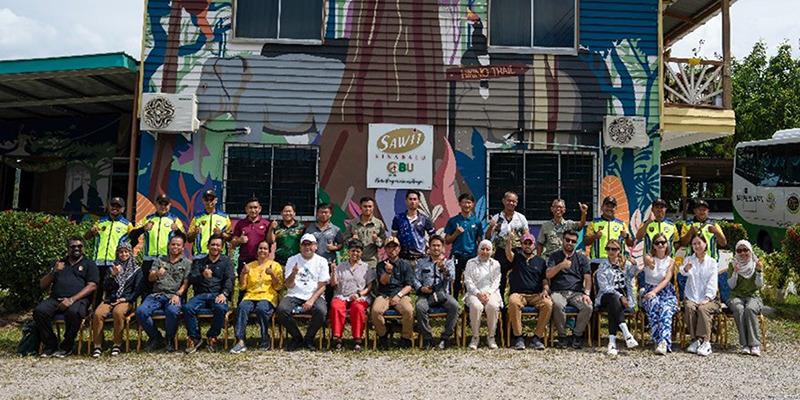
Visit to Sungai Pin Conservation Area
To strengthen global understanding of the Malaysian sustainable palm oil industry, the Malaysian Palm Oil Council (MPOC) recently hosted a familiarisation visit for international journalists from 15 to 21 June 2025. The programme brought together media representatives from India, Pakistan, the Philippines, Egypt, Kazakhstan, Uzbekistan, and Türkiye for an immersive, on-the-ground experience across Peninsular Malaysia and Sabah.
The visit began with a simple but important goal: to bridge the knowledge gap between perception and reality. For many, palm oil has long been a misunderstood commodity. But through site visits, dialogue sessions, and open conversations, the group was invited to see for themselves how Malaysia is addressing global concerns around traceability, labour practices, and environmental responsibility.
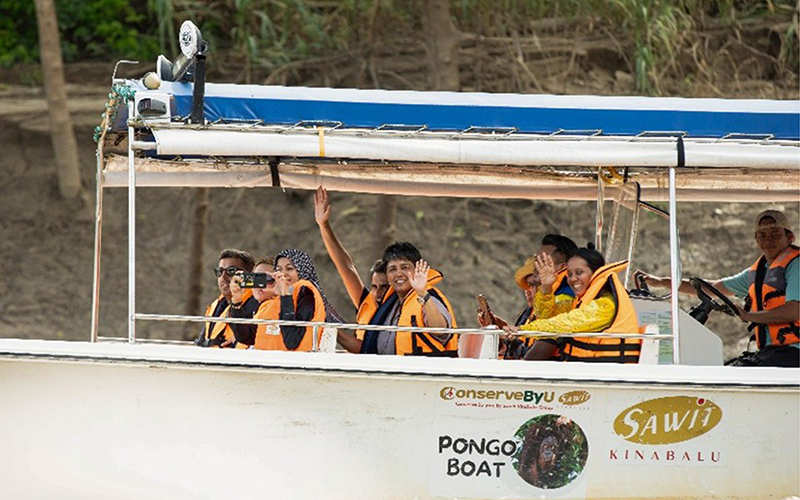
Journalists on a river cruise at the Sungai Pin Conservation Area
Key to this is the Malaysian Sustainable Palm Oil (MSPO) certification—a government-backed, mandatory scheme that sets strict standards across the value chain. Journalists learned how MSPO covers environmental and social criteria alongside ensuring smallholder inclusion, biodiversity conservation, and governance from the ground up.
In Sabah, the group was welcomed by the Sawit Kinabalu Group, one of the leading state-owned players in Malaysia’s palm oil industry. Here, journalists had the opportunity to step into real plantation operations—walking through rows of oil palm trees, observing responsible field practices, and learning how efficient milling processes are applied on-site. It was not just a technical visit; it was a chance to see how sustainability is embedded into daily operations, not just policy documents.
The experience continued with a visit to the Sungai Pin Conservation Area, a dedicated reforestation and habitat restoration zone managed by Sawit Kinabalu. As they explored the site, journalists saw firsthand how conservation efforts are being integrated into oil palm landscapes—where protecting native flora and fauna, and maintaining wildlife corridors, go hand-in-hand with agricultural activity. It was a clear example of how operational excellence and environmental responsibility can coexist on the ground.
As part of their field visits, journalists toured smallholder plantations under the Wild Asia Group Scheme (WAGS). This grassroots initiative empowers independent oil palm smallholders to adopt sustainable, regenerative practices. The programme goes beyond conventional farming by focusing on soil health restoration, biodiversity enhancement, and improved water retention. These techniques not only reduce environmental impact but also boost long-term productivity and resilience—particularly important for smallholders who often operate with limited resources.
During the visit, the group observed two contrasting smallholder farms: one managed using conventional methods, and the other part of the WAGS BIO programme, which promotes regenerative agriculture. The differences were immediately visible. The BIO plot had darker, healthier soil, richer ground cover, and better moisture retention—results of practices such as composting, cover cropping, biochar application, and reduced reliance on agrochemicals.
But the benefits go beyond the land. Farmers in the WAGS BIO programme have reported lower input costs and improved yields. For many, this approach has become a pathway to improved livelihoods.
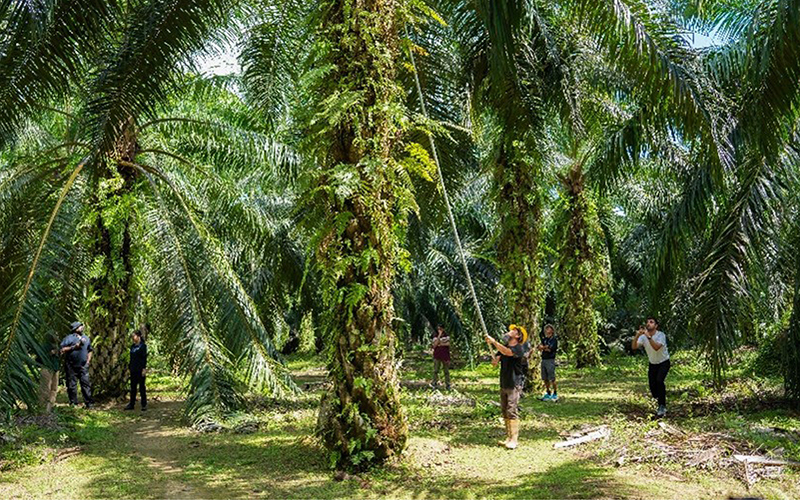
Mr. Muharram, a smallholder under the WAGS programme, demonstrating the oil palm harvesting process on his BIO Farm.
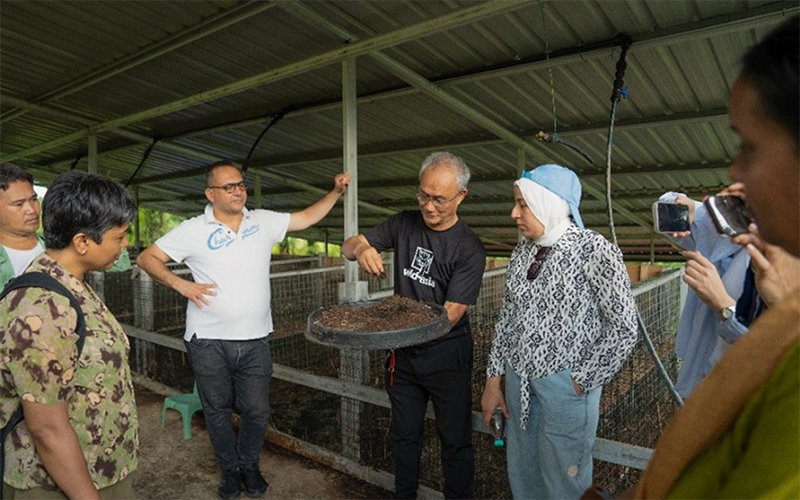
A visit to Wild Asia’s Living Lab to explore regenerative farming practices in sustainable palm oil production
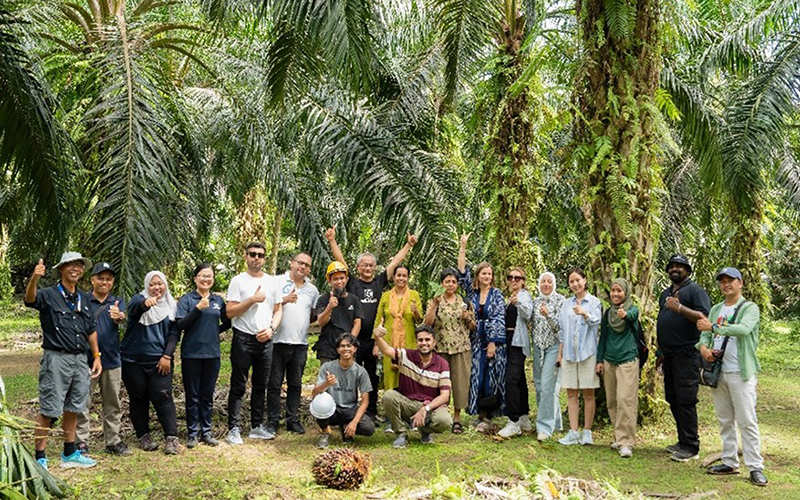
Visit to smallholders’ farms to learn about sustainable practices on the ground
In Peninsular Malaysia, a highlight was the visit to SD Guthrie’s EcoGardens on Carey Island. The group explored the Palm Oil Experience Centre and their Robotics Facility, where they saw up-close how technology from robotics to field automation is being used to increase yields while reducing labour dependency and elevating sustainability outcomes. It was a clear signal that Malaysia is not standing still; innovation is paving the way.
A seminar session with experts from the Malaysian Palm Oil Board (MPOB), the Malaysian Sustainable Palm Oil (MSPO), and MPOC allowed journalists to engage in an open discussion. Discussions revolved around R&D advancements, the robustness of MSPO, and the nutritional benefits of palm oil. The dialogue session allowed journalists the opportunity to ask critical questions and engage with experts on the future of sustainable palm oil production.

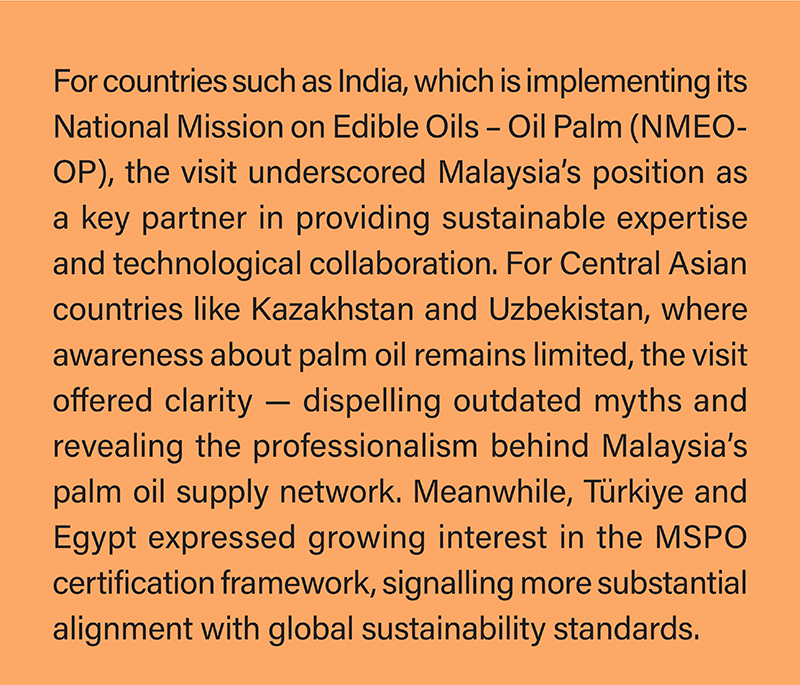
The itinerary was not limited to the commercial side of palm oil. A visit to the Malayan Tiger Conservation Centre (MTCC) and the National Elephant Conservation Centre (NECC), organised in collaboration with PERHILITAN and the Malaysian Palm Oil Green Conservation Foundation (MPOGCF), offered a powerful reminder that Malaysia’s sustainability journey includes wildlife and biodiversity, not just agriculture.
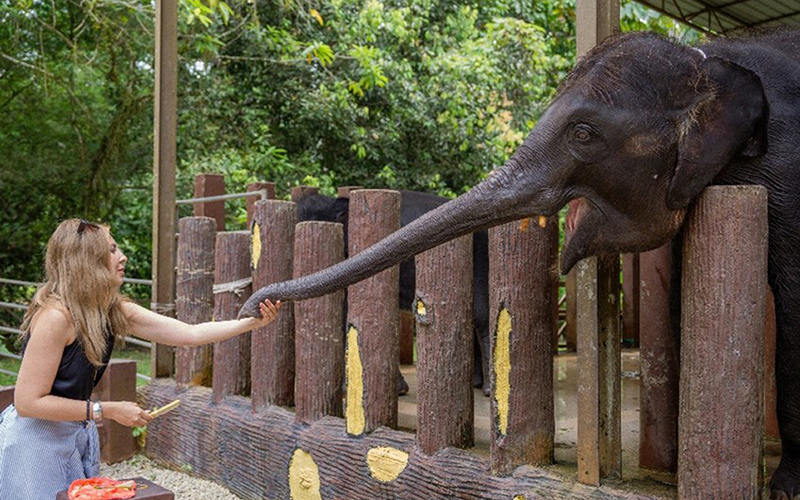
A demonstration by elephants and their mahouts showcasing trained behaviours used in daily care
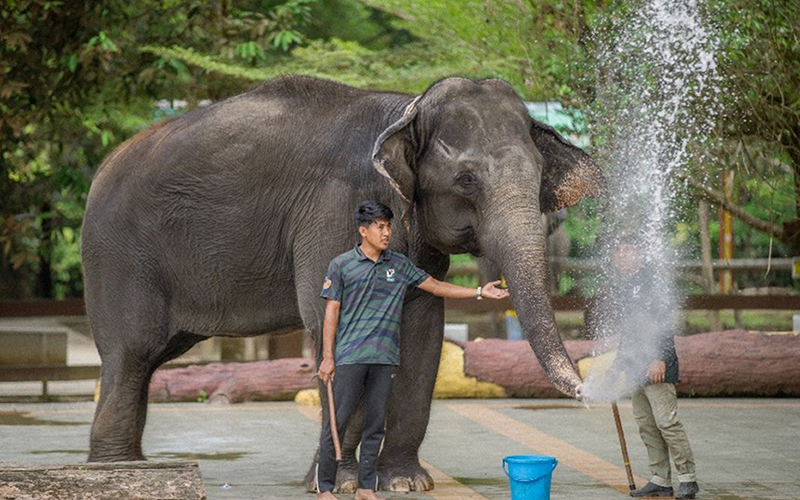
A feeding session at NECC, where journalists gained insight into elephant care and conservation efforts
For many of the participants, the visit shifted their perception. What had previously been shaped by headlines or assumptions was now grounded in observation and experience. The opportunity to ask questions, challenge perspectives, and witness the industry up close proved to be a turning point.
“Before the trip, I had a rather stereotypical view of palm oil,” said Aziza Mambekova, a journalist from Uzbekistan. “But I saw professionalism, innovation, and a sincere commitment to sustainability.”
For Malaysia, these familiarisation visits are not just about promotion — they are about positioning the country as a credible, forward-looking leader in sustainable palm oil.








